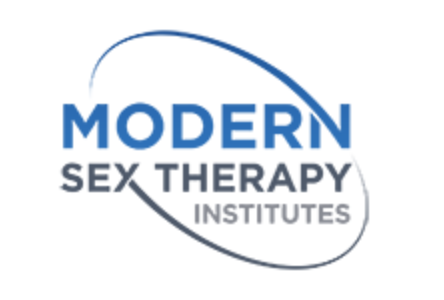SEx therapy
I am a certified sex therapist (CST) through the American Association of Sexuality, Educations, Counselors, and Therapists.
I completed my sex therapy training through Modern Sex Therapy Institutes.
My approach
Sex therapy is not just about fixing problems; it's about embracing pleasure, enhancing intimacy, and empowering individuals and couples to experience fulfilling and satisfying sexual relationships with self and others.
As a sex therapist, I am dedicated to creating a safe, non-judgmental space that honors all aspects of your identity and desires. Whether you are exploring your sexuality, navigating relationships, overcoming a sexual issue or seeking to understand and embrace your kinks, I am here to support you with compassion and expertise.
I am body-positive, sex-positive, and kink-positive, believing that everyone deserves to experience joy, connection, and pleasure in their own way. Together, we will work towards your goals, fostering a deeper understanding of yourself and your relationship(s).
Your story matters, and I am here to listen.
I am LGBTQIA+ affirming and welcome people of all genders, sexual orientations and relationship structures.
Focuses on helping a person address and resolve personal sexual concerns, improve sexual functioning, and enhance overall sexual well-being.
It is important to note that you can attend sex therapy if you are currently single or partnered.
Supports partners in addressing and resolving sexual issues, improve their sexual relationship, and enhance overall intimacy.
Couples can learn tools on how to communicate more effectively, practice skills and techniques between sessions and create safety that is often foundational in fostering exploration and expansion.
Areas of sexual health speciality
-
Low Libido: Reduced interest or desire for sexual activity.
Erectile Dysfunction (ED): Difficulties achieving or maintaining an erection.
Involuntary Ejaculation: Ejaculating sooner than desired.
Delayed Ejaculation: Difficulty in reaching ejaculation.
Anorgasmia: Inability to achieve orgasm.
Painful Intercourse (Dyspareunia): Pain experienced during sex. Conditions can be caused by:
Vaginismus
Vulvodynia
Endometriosis
Postpartum/breastfeeding
Interstitial Cystitis
Pelvic Inflammatory Disease (PID)
Skin disorders
SEXUAL CHALLENGES CAN BE ADDRESSED AS A PART OF INDIVIDUAL THERAPY OR COUPLES THERAPY. PLEASE CONTACT ME FOR A FREE CONSULTATION TO DETERMINE THE BEST MODE OF TREATMENT FOR YOUR SPECIFIC CONCERN.
-
Performance Anxiety: Fear of not being able to perform sexually.
Body Image Issues: Negative perceptions of one's own body that affect sexual confidence.
Sexual Trauma: Addressing the effects of past sexual abuse or trauma.
Emotional Issues: Dealing with stress, depression, or anxiety that impacts sexual health.
Relationship issues: Breaches in trust, not feeling supported and struggling to emotionally and cognitively connect with your partner can lead to sexual disconnection.
PSYCHOLOGICAL ISSUES CAN BE ADDRESSED AS A PART OF INDIVIDUAL THERAPY OR COUPLES THERAPY. PLEASE CONTACT ME FOR A FREE CONSULTATION TO DETERMINE THE BEST MODE OF TREATMENT FOR YOUR SPECIFIC CONCERN.
-
Mismatch in Libido: Differences in sexual desire levels between partners.
Lack of Sexual Variety: Addressing monotony and introducing new elements to the sexual relationship.
DESIRE DISCREPANCIES CAN BE ADDRESSED AS A PART OF INDIVIDUAL THERAPY OR COUPLES THERAPY. PLEASE CONTACT ME FOR A FREE CONSULTATION TO DETERMINE THE BEST MODE OF TREATMENT FOR YOUR SPECIFIC CONCERN.
-
Talking About Sex: Difficulty discussing sexual needs, preferences, and concerns.
Expressing Desires: Struggles in expressing sexual desires or setting boundaries.
Sharing Kinks and Fantasies: Sharing a kink can be challenging due to stigma and fear of rejection.
-
Parenthood: Adjusting to changes in sexual relationship after having children.
Aging: Coping with changes in sexual function and desire as partners age.
Health Issues: Managing the impact of health problems on the sexual relationship.
-
I utilize trauma informed modalities and evidence based interventions in the treatment of sexual trauma.
See my page on Trauma Treatment to learn more my approach to treating trauma.
Why is working with a certified sex therapist important?
Sexuality is one of the most intricate, intimate, and vulnerable aspects of the human experience. A Certified Sex Therapist undergoes over 150 hours of specialized training in human sexuality, relationships, and mental health, which significantly exceeds the education typically required in standard graduate psychology and counseling programs. Additionally, they receive bias and sensitivity training and are supervised for more than 18 months to ensure they apply their knowledge ethically and effectively. This rigorous certification process demands a high level of commitment, offering extra assurance in the therapist's expertise.
Since the title of Certified Sex Therapist is not regulated in every state, some individuals may use the title without having undergone the extensive training it usually entails. While many of these clinicians are well-intentioned and passionate about their work, good intentions alone are not always sufficient for providing effective care, particularly given the sensitive nature of sexuality. It is advisable to seek sex therapy or counseling from a professional with comprehensive training and proper credentials to ensure the best support for issues related to sexual function.
I am focused on the intersection of mental health and sexuality - I advocate for a holistic and culturally informed approach to mental health, relationships, and sexuality.
Still unsure whether to Emphasize individuals or couples Sex therapy?
-
Individual: Best suited if the issues are predominantly internal, such as anxiety, trauma, body image concerns, or performance anxiety that impacts sexual functioning. Individual therapy allows clients to address these underlying psychological concerns in a focused way.
Couples: Preferred if the challenges involve communication breakdowns, mismatched desire, or relational dynamics affecting intimacy. Couples therapy can help partners address these issues together and work on developing healthier patterns of connection.
-
Individual: If the individual’s main goal is personal growth and understanding their own sexual desires, behaviors, or challenges, individual therapy may be more appropriate.
Couples: If the goal is to improve the sexual relationship or resolve mutual concerns like mismatched libido, couples therapy can provide a structured setting for collaborative problem-solving and enhanced communication.
-
Individual: If the issue is a longstanding personal issue like trauma, sexual shame, or anxiety has been impacting one partner long before the relationship, individual therapy might be necessary initially to work through these deeper layers.
Couples: If the sexual concerns have arisen or escalated within the context of the current relationship/dynamic, couples therapy is generally beneficial, as it allows both partners to address how each contributes to or experiences the issue.
Here are some additional things to consider…..
-
Individual: For some individuals, discussing highly personal concerns, such as specific anxieties or fantasies, may feel more comfortable in individual therapy. This can build confidence, comfort in talking about difficult things and self-understanding before involving a partner in therapy.
Couples: Couples therapy offers a space for partners to openly share concerns and develop trust by tackling sensitive topics together, which can be vital for issues like intimacy and desire discrepancies. Mutual vulnerability and trust-building can help couples feel more connected to each other and the process.
-
Integrating Both: For some clients, a combination of individual and couples therapy can be beneficial. Working individually on personal concerns while simultaneously addressing relational dynamics in couples therapy allows for a comprehensive approach, helping clients make progress on both personal and interpersonal fronts.
This often looks like having 2-3 couple’s sessions, followed by individual sessions for further assessment.
Together we decide on a structure that honors the needs of your relationship and both of you as individuals.
Reach out for a free consultation call and we can explore what this approach might look like for your relationship.





